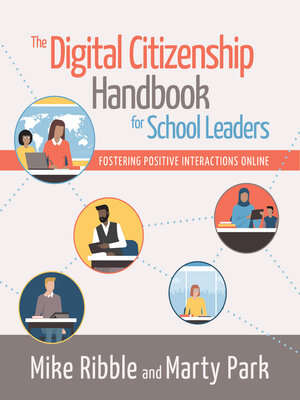The Digital Citizenship Handbook for School Leaders
ebook ∣ Fostering Positive Interactions Online
By Mike Ribble

Sign up to save your library
With an OverDrive account, you can save your favorite libraries for at-a-glance information about availability. Find out more about OverDrive accounts.
Find this title in Libby, the library reading app by OverDrive.



Search for a digital library with this title
Title found at these libraries:
| Loading... |
Learn how to develop a meaningful approach to embedding digital citizenship into an established program, helping your students succeed in a digital world.
In today's schools and districts, just saying "no" to bad technology practices is not enough. This leadership posture can take the form of extreme blocking and filtering of websites, providing little access to devices and declining to integrate digital tools and resources into learning out of fear of what else a student might do. Such a mindset can also lead to adults choosing not to engage — or being unable to engage — in conversations when students share stories about what a peer did online or through the latest app.
Digital citizenship curriculum needs to be taught at two levels at once — horizontal (the world immediately around students) and vertical (connecting to the rest of the world). This book provides education leaders a strategic road map that demonstrates how to incorporate these concepts into the curriculum so that digital citizenship isn't just "one more thing," but is threaded into the DNA of how educators teach and work.
The book:Provides a five-year-plan for developing a digital citizenship program in your school. Covers such topics as digital ethics and leveled approaches to digital citizenship. Walks through the digital citizenship responsibilities and opportunities inherent in various roles, including library media specialists, classroom educators and special ed teachers. Offers strategies for spreading digital citizenship internationally and explores the future of digital citizenship.
The book offers school and district leaders a path toward a shared and collective understanding so that digital citizenship is embedded in the way students and educators interact with technology and each other. It is a guide for school communities to discover which practices, in the end, will lead to better people.
Audience: K-12 educators, education leaders
In today's schools and districts, just saying "no" to bad technology practices is not enough. This leadership posture can take the form of extreme blocking and filtering of websites, providing little access to devices and declining to integrate digital tools and resources into learning out of fear of what else a student might do. Such a mindset can also lead to adults choosing not to engage — or being unable to engage — in conversations when students share stories about what a peer did online or through the latest app.
Digital citizenship curriculum needs to be taught at two levels at once — horizontal (the world immediately around students) and vertical (connecting to the rest of the world). This book provides education leaders a strategic road map that demonstrates how to incorporate these concepts into the curriculum so that digital citizenship isn't just "one more thing," but is threaded into the DNA of how educators teach and work.
The book:
The book offers school and district leaders a path toward a shared and collective understanding so that digital citizenship is embedded in the way students and educators interact with technology and each other. It is a guide for school communities to discover which practices, in the end, will lead to better people.
Audience: K-12 educators, education leaders






